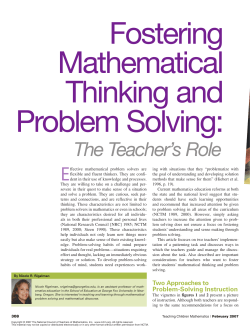
University of Glasgow Department of Mathematics Course 1S 2009-2010 Information for Students
University of Glasgow Department of Mathematics Course 1S 2009-2010 Information for Students Class Head Dr J.J.C. Nimmo (Mathematics Building, room 408, email: j.nimmo@maths.gla.ac.uk) About the Course Mathematics 1S is a Level-1 module, worth 20 credits, taught during the second semester. The pre-requisite for the course is a pass in Higher Mathematics or any equivalent qualification and a co-requisite in either Mathematics 1R or 1X. The course is available to students in most faculties, but not normally to those in the Faculty of Engineering. 1 1.1 How to get information Class website Go to the faculty Moodle site http://fims.moodle.gla.ac.uk/ and log in using your Glasgow User ID (GUID) and password. On your first visit you will need to enrol in Mathematics Level-1 Moodle. Then navigate to Mathematics 1S. From this site you will be able to download copies of exercises and answers/solutions, lecture notes, past exam papers, handouts and view other useful information. 1.2 Class noticeboard This is outside lecture room 325, one floor up from the main entrance in the Mathematics Building. Details of assignment of students to sections and (later) tutorial groups together with dates of exams etc. will be posted here. Students should also consult the class website (see §1.1.) 1.3 Mathematics General Office Enquiries about the organisation of the class should be made initially at the Mathematics General Office on Level 3 in the Mathematics Building. Opening times are displayed next to the enquiry window. 2 2.1 Organisation and work of the class Sections The class runs at three different times 10 a.m., 11 a.m. and 4 p.m. Depending on the times of your other classes, you will be assigned to a section meeting at one of these times. You will attend the same section every day, from Monday to Friday. Normally, you should come at the same time as you had lectures in 1R. Sometimes we refer to the weeks of the year by number. The first week of teaching in the second semester is Week 17. A weekly schedule for each section of the class is shown at the end of this document and this gives these week numbers as well as the date of the Monday of each week. 1 2.2 Lectures In a normal week, there will be four lectures, two on Algebra and two on Calculus, given by different lecturers. These lectures cover all the mathematics in the syllabus and include many worked examples. You should take your own notes at these lectures and use these when working on exercises, either at tutorials or in your own time, and when revising for examinations. Typed lecture notes are also available for download on the class website (see §1.1). The first lecture in on Monday 11th January. It is a requirement for credits that students attend lectures (see §4.4) 2.3 Exercises and homework All exercises for the course are contained in a document that will be handed out at the first lecture. Several of these exercises will be assigned as homework each week. This will be announced at the Thursday or Friday lecture (depending on the section) to be handed in on Monday or Tuesday (as directed) the next week. It is a requirement for credits that students hand in homework (see §4.4) In addition to the homework exercises, there will be a number additional exercises to be completed either at your tutorial or in your own personal study. The question numbers for the weekly homework and addition exercises are also posted on the class website (see §1.1). 2.4 Tutorial arrangements Tutorials take place in groups of 15 or so students, with one staff or postgraduate student tutor. The homework you hand in will be corrected by the tutor and returned to you at the tutorial. Tutors will deal with any issues arising from the homework problems, and will lead the group through tackling some of the additional weekly exercises. It is a requirement for credits that students attend tutorials (see §4.4) 2.5 Workshop questions The latter half of the tutorials taking place in Weeks 19, 21, 23, 25 and 27 will be set aside for students to tackle workshop questions. These are mini tests covering the work of the class in the previous two weeks and the best four of the five of them contribute a total of 40% to the overall assessment for the course (see §4.3). Note the differences between 1R and 1S: 5 workshops rather than 4, the best 4 are worth 40% rather than 20%. Sample questions will be handed out on the Fridays of preceding weeks to allow students to prepare to tackle these questions. It is a requirement for credits that students attempt workshop questions (see §4.4) 2.6 Personal Study It is expected that students spend 5–7 hours (or more, if necessary) per week on mathematics in addition to attending lectures and tutorials. This time can be spent on reading lecture notes and textbooks, tackling the weekly homework problems and additional exercises and getting help with aspects of the lecture notes they do not understand or with exercises they cannot do. We offer a variety of ways to get help and these are described in §3. 2 2.7 Textbooks No purchase is essential but students may wish to consider buying one of the following texts. • Robert A. Adams and Christopher Essex Single Variable Calculus (Pearson Custom Publication) This is a custom text containing all of the Calculus needed in Mathematics 1R and 1S. It does not cover the Algebra part of either course and is not a recommended text for 1T in the second semester. The price of the book also gives access to online resources, such as additional step-by-step exercises, at MyMathLab http://www.mymathlab.com/. • C.M. McGregor, J.J.C. Nimmo, W.W. Stothers Fundamentals of University Mathematics (2nd Edition) (Horwood Publishing) This text covers all of the material Mathematics 1R and 1S, Calculus and Algebra, in a slightly more theoretical way than the present course. • Robert A. Adams and Christopher Essex Calculus: A Complete Course (7th Edition) (Pearson) This is the complete text, of which the custom text is approximately half, containing all of the Calculus needed in Levels-1 and 2 Mathematics courses. Although it covers the material in the Level-2 Calculus courses, it is not at present a recommended text for these. Students already committed to taking Mathematics at Level-2 might consider purchasing this book. 3 Study support If you need help understanding topics covered in lectures or tutorials you should, in the first instance, discuss the problem with one of your lecturers or your tutor. Students who wish to seek extra assistance are welcome to call (either individually or in small groups) on one of their lecturers at his/her office. Lecturers will intimate the “Office Hours” when they will be available for this purpose. You may also arrange an appointment by email. Contact details for all lecturers are given on the weekly schedules at the end of this document. 3.1 Skills programme There are a number of key mathematical skills, part of any school syllabus, proficiency in which is essential to success in Level-1 and subsequent courses in mathematics, physics and other subject requiring mathematical techniques. Examples of such key skills include the ability to expand brackets in algebraic expression, simplify fractions and recognise the graphs of some simple functions. These skills are used frequently as part of what you will study in the class and in exercises and exam questions that are set, but they are not taught directly in lectures. If a student lacks fluency in these basic skills their performance in exams will be adversely affected. When a student works on developing proficiency in these skills, confidence in their own abilities and enjoyment of mathematics will increase and with that comes better grades! The department and university are strongly committed to support of students in the difficult transition from school level to university level mathematics and has put in place various support schemes. These are intended both to help with basic skills and also to support the work of the Level-1 maths classes in general. These schemes are coordinated in the department by Dr Stuart White (skills@maths.gla.ac.uk) 3 and are described in a separate document “Level-1 Mathematics Support” and on its own Moodle page (visit http://fims.moodle.gla.ac.uk/ and navigate to Level-1 Mathematics Support). 3.2 Skill Drill and Skills Test Basic skills can be practised using the online, multiple choice Skill Drill, and then students may move on to take the Skills Test to prove that these skills have been mastered. The department regards it as vital that all mathematics students should demonstrate proficiency in the key skills during their first year at university and so a pass in the Skills Test is a pre-requisite for entry to Level-2 Mathematics. The skills covered are so fundamental to competence in mathematics that, as in a driving test, to examine them requires a test with a much higher pass mark (80%) than in a normal one. Also like a driving test, some students pass this test first time whereas for most it requires several attempts before they are successful. There will be many opportunities to sit this test throughout the year but, of course, all students should aim to pass this as soon as possible. 4 Assessment and Award of Credits 4.1 Class Test There is no Class Test. 4.2 Degree Examination This will be held in the April/May exam diet. It will consist of one 2 hour long paper and contributes 60% to the overall assessment. All questions should be completed to obtain full marks. There is a resit examination in August. 4.3 Summary of assessment 1. Workshop questions: 40% (based on the best 4 of 5), 2. Degree Examination: 60%. 4.4 Minimum Requirement for the Award of Credits To be awarded the credits for Mathematics 1R, a student must: (a) be present at lectures on at least 50% of the occasions on which attendance is checked; (b) attend at least 70% of tutorials; (c) hand in homework on at least 70% of the occasions when such work is set; (d) attempt each set of Workshop questions; (e) sit the Degree Exam in April/May. Notes • Of course, if you have a valid reason (e.g. illness) for missing part of the assessment or failing to meet the minimum requirements for credits, this will be taken into account. See §5.1 for instructions on how to report absences. In particular, under University Regulations, students who are absent without valid reason from the Degree Examination in April/May will be permanently refused credits for the 4 course. In these circumstances especially, it is very important that you give proper notice of this (see §5.1.) In order to obtain the credits, such students will need then to sit the Degree Exam in August. • Students should aim for full attendance and to hand in all homework, rather than the minimum requirements specified in (a), (b), (c) above. 4.5 Grades Every student who has satisfied the minimum requirement specified above will be awarded a grade from A to H. Normally, the ‘pass’ borderline between D and E is set somewhere between 45% and 50%. The precise borderlines between all grades are decided by the Board of Examiners. Notes • poorer than grade D is insufficient to ensure progress to Level-2 Mathematics; • resit results will not normally give more than the equivalent of a grade D. 5 5.1 Miscellaneous items Absences If you are absent for more than 7 days, or if you have valid reasons for missing any part of the assessment (see §4.3) or failing to meet the minimum requirements for credits (see §4.4), you need to record this fact. For detailed instructions on how to do this, visit http://senate.gla.ac.uk/academic/policies/ and follow the link to Absence policy (students). 5.2 Staff-Student Committee The department has a Staff-Student Committee with student representative from all levels. An invitations for nominations for a 1S class representative will be given in the next few weeks. You can contact the Staff-Student Committee through your class representative (or through any other member of the Committee whether staff or student). For information about staff members and student representatives, see the class website (see §1.1) or noticeboard (see §1.2). 5.3 Use of calculators in examinations Any sufficiently simple calculator may be used in examinations. Each examination paper bears the following rubric, which is strictly enforced: An electronic calculator may be used provided that it does not have a facility for either textual storage or display or for graphical display. 5.4 Prizes It is customary to award prizes and bursaries to students who perform best in the overall assessment in Level-1 (1R+1S, 1R+1T or 1X+1Y). Around fifteen awards, worth between £50 and £200 each, are made every year. 5 6 Progress to other mathematics courses A pass in the Skills Test (see §3.2) is a pre-requisite for entry to all Level-2 Mathematics courses. Achieving grade D or better in both 1R and 1S or 1R and 1T (or 1X and 1Y) will contribute to the entitlement of a student to take Level-2 Mathematics courses. 6 Lecture room: Maths 325 Lecture room: Graham Kerr LT1 1 2 3 4 5 6 7 8 9 10 11 21/9 28/9 5/10 12/10 19/10 26/10 2/11 9/11 16/11 23/11 30/11 Monday L L L L L L L L TEST L L Tuesday L L L L L L L L L L L Wednesday L T W T W T W T L W L Thursday L L L L L L L L L L R Friday L L L L L L L L L L R Key: L=lecture, T=tutorial, W=Workshop tutorial, TEST=Class Test, R=Revision lecture Homework: Announced at the Thursday lecture and handed in each Monday. Calculus lecturer: Prof. S. J. Pride (office - 431, email - s.pride@maths.gla.ac.uk) Week starting EX EX 13 14/12 AM S 13 14/12 AM S 12 7/12 Tutorial rooms: Various, to be announced Weekly schedule for Mathematics 1R2 Algebra lecturer: Dr T. Brendle (office - 526, email - t.brendle@maths.gla.ac.uk) Time: 11 a.m. Week starting 1 2 3 4 5 6 7 8 9 10 11 21/9 28/9 5/10 12/10 19/10 26/10 2/11 9/11 16/11 23/11 30/11 Monday L L L L L L L L TEST L L Tuesday L L L L L L L L L L L Wednesday L T W T W T W T L W L Thursday L L L L L L L L L L R Friday L L L L L L L L L L R Key: L=lecture, T=tutorial, W=Workshop tutorial, TEST=Class Test, R=Revision lecture Homework: Announced at the Thursday lecture and handed in each Monday. Calculus lecturer: Dr J. J. C. Nimmo (office - 408, email - j.nimmo@maths.gla.ac.uk) 12 7/12 Tutorial rooms: Various, to be announced Algebra lecturer: Dr C. Athorne (office - 406, email - c.athorne@maths.gla.ac.uk) Time: 10 a.m. Weekly schedule for Mathematics 1R1 Lecture room: Maths 515 1 2 3 4 5 6 7 8 9 10 11 21/9 28/9 5/10 12/10 19/10 26/10 2/11 9/11 16/11 23/11 30/11 Monday L L L L L L L L TEST L L Tuesday L L L L L L L L L L L Wednesday L L L L L L L L L L L Thursday L T W T W T W T L W R Friday L L L L L L L L L L R Key: L=lecture, T=tutorial, W=Workshop tutorial, TEST=Class Test, R=Revision lecture Homework: Announced at the Friday lecture and handed in each Tuesday. Calculus lecturer: Dr I. S. Murphy (office - 430, email - i.murphy@maths.gla.ac.uk) Week starting EX EX 13 14/12 AM S 13 14/12 AM S 12 7/12 Tutorial rooms: Various, to be announced Weekly schedule for Mathematics 1R4 Algebra lecturer: Dr D. Stevenson (office - 434, email - d.stevenson@maths.gla.ac.uk) Time: 4 p.m. Week starting 1 2 3 4 5 6 7 8 9 10 11 21/9 28/9 5/10 12/10 19/10 26/10 2/11 9/11 16/11 23/11 30/11 Monday L L L L L L L L TEST L L Tuesday L L L L L L L L L L L Wednesday L L L L L L L L L L L Thursday L T W T W T W T L W R Friday L L L L L L L L L L R Key: L=lecture, T=tutorial, W=Workshop tutorial, TEST=Class Test, R=Revision lecture Homework: Announced at the Friday lecture and handed in each Tuesday. Calculus lecturer: Dr R. Simitev (office - 408, email - r.simitev@maths.gla.ac.uk) Algebra lecturer: Dr R. J. Steiner (office - 513, email - r.steiner@maths.gla.ac.uk) 12 7/12 Lecture rooms: Maths 204 (Monday); Maths 326 (Tuesday, Wednesday); Boyd Orr LT D (Thursday, Friday) Tutorial rooms: Various, to be announced Time: 11 a.m. Weekly schedule for Mathematics 1R3
© Copyright 2025











